By Lucy Komisar
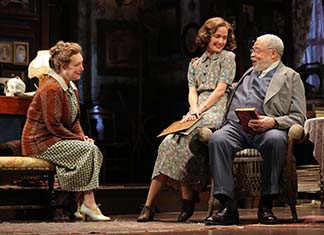
If you thought television invented sitcoms, with nutty family members and their wacky friends, you are wrong. Just go back to 1936, when George S. Kaufman and Moss Hart presented “You Can‘t Take it With You.”
Maybe Americans liked it, because it took their minds off the Depression. The Pulitzer jury gave it a prize, which I think was stretching. It‘s occasionally a cute and quirky play, but never a great play. Makes one wonder why director Scott Ellis wanted to revive it. Other than to show where sitcoms came from.
The play is a venue for Kristine Nielsen as the comically bizarre Penelope Sycamore, the mother of the family, who writes forgettable plays, because eight years ago someone delivered a typewriter by mistake. Nielsen‘s jerky comic gestures are now familiar and often endearing.
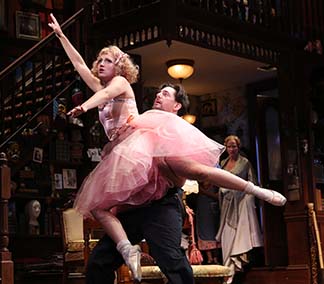
It‘s also a place for Reg Rogers as Boris, the Russian dance instructor, who speaks and moves in the exaggerated diction and body language that one expects from Rogers in comic roles. Indeed, the cast is generally good.
Otherwise, the play is a rather silly if sometimes funny tale about a young woman, Alice Sycamore (Rose Byrne) who has developed a romantic attachment to Tony Kirby (Fran Kranz), the son of a Wall Street broker for whom she works, and invites him and his parents home to meet the folks. That includes James Earl Jones as Grandpa, who offers wisdom about how to live. And her sister, Essie (the appealing Annaleigh Ashford), who moves on point while husband Ed accompanies on the xylophone, with a repertoire that includes “Ode to Joy.”
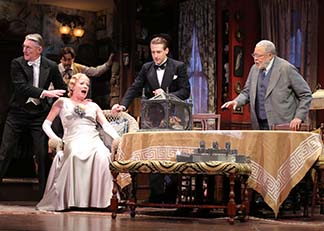
The crisis occurs when Tony brings his folks a day early, in time for the stiff Kirbys to be shocked by a glass container of snakes, a drunken actress (a terrific Julie Halston) asleep on the couch, and Penelope‘s husband, Paul (Mark Linn-Baker) and his buddy making and blowing up fireworks in the basement. Then there’s Boris throwing the elder Kirby (Byron Jennings) onto the floor in a wrestling hold. Never a dull moment.
I wasn‘t pleased by the right-wing running joke about Grandpa (Jones, a bit too mild for his ornery character) refusing to pay incomes taxes, especially when he remarks with dismay that “I‘m supposed to give the money to keep Donald on relief.” Jones plays Grandpa as if he was a white guy, like the rest of the family. As he is pretty light-skinned, you would hardly doubt it.
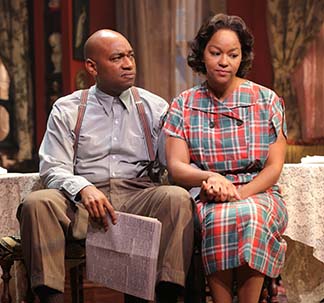
Donald (Marc Damon Johnson), a handyman, whose girlfriend Rheba is the maid (a terrific Crystal Dickinson), is obviously a black guy. So the meme is why should I pay taxes to keep somebody, particularly a black guy, on the dole? (Donald and Rheba were played by black actors – Oscar Polk and Ruth Attaway — in the original production when overt racism didn’t embarrass liberals — except, does this really now?)
Hey, Kaufman and Hart, remember, this is 1936, the middle of the Depression, with 25% of the country out of work. Grandpa stopped working 35 years ago, because he just didn‘t want to, but apparently has enough money for the IRS to tell him he owes back taxes. He doesn’t believe in paying taxes for government services. Isn’t that being on the dole? (Come to think of it, rich tax dodgers have the same attitudes today.)
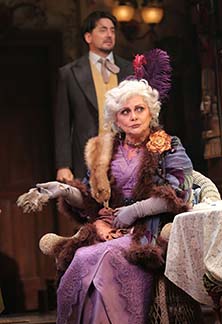
The thirties was a leftist era for many artists, so the authors take care to have Boris make some anti-Stalin jokes. Elizabeth Ashley does a cameo as Olga, an exiled Russian aristocrat now working at the Childs Restaurant in Times Square. Remember Childs?
After Grandpa persuades Mr. Kirby that he should follow his bliss (sorry, that‘s a new meme) and forget about Wall Street, (spoiler alert) Kirby decides that it‘s fine to be part of this dysfunctional family. Kirby’s hobby is growing orchids, just right for a rich guy. Mrs. Kirby doesn‘t appear again, so we don‘t know what she thinks. But as her hobby is spiritualism, she probably would fit in fine.
Director Ellis keeps up a lively pace. There‘s a terrific set by David Rockwell with an interior chock full of pictures and paintings and masks and other gee-gaws on the walls. Fix the social politics, and this is perfect for TV.
“You Can‘t Take it With You.” Written by George S. Kaufman and Moss Hart; directed by Scott Ellis. Longacre Theatre, 220 West 48th Street, New York City. 212-239-6200 or 800-447-7400. Opened Sept. 28, 2014; closes Feb 22, 2015. 10/9/14.

